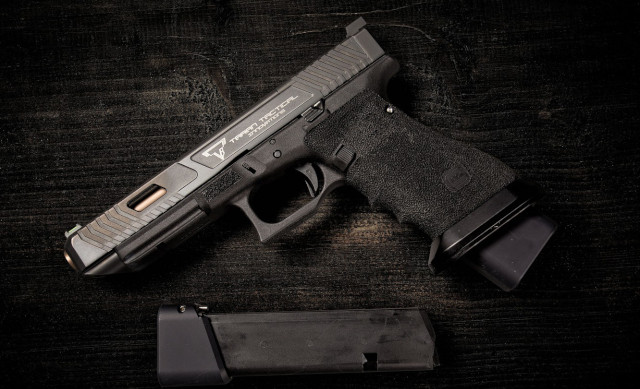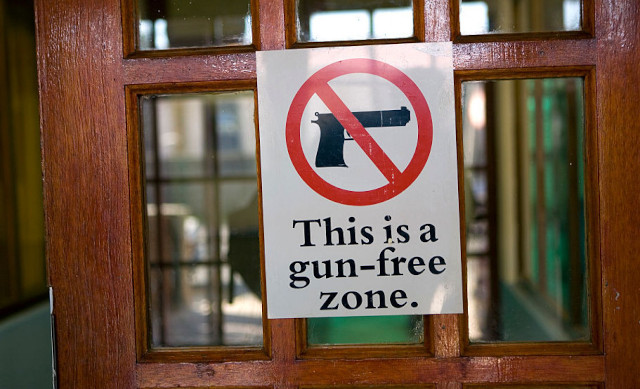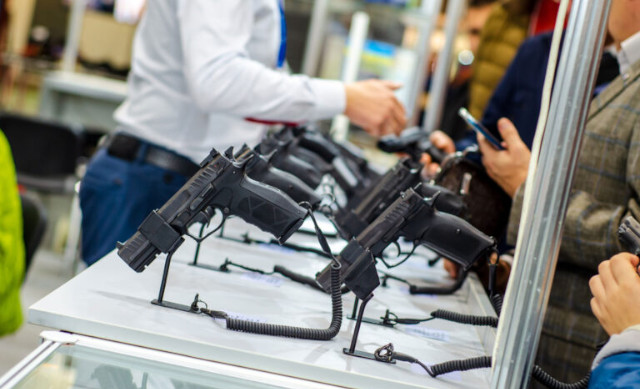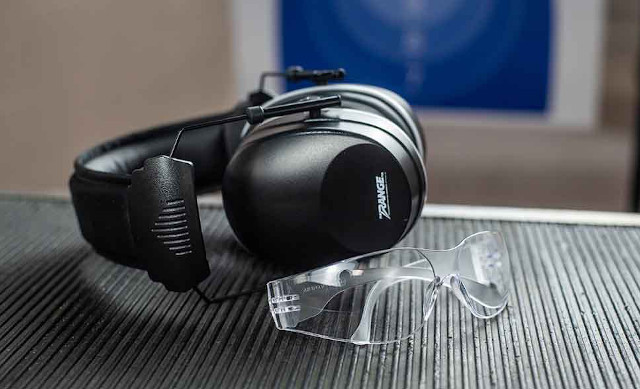By Marvin Marroquin • Updated: 03/02/2023 • 9 min read
Owning a gun can be a rewarding and enjoyable experience, but it’s important to approach the process of purchasing your first gun with care and consideration. Before making a purchase, it’s crucial to understand the laws and regulations surrounding gun ownership and to choose a gun that meets your needs and budget.
In this complete guide to buying your first gun, I’ll cover everything you need to know about choosing the right gun, navigating gun laws and regulations, purchasing a gun, and practicing safe gun handling and maintenance. Whether you’re looking for a gun for self-defense, hunting, or target shooting, this guide will help you make an informed decision and enjoy your gun responsibly.
How to Choose the Right Gun
Before you even think about pulling the trigger, first thing’s first, think about what you’re gonna use it for. Are you looking for a gun for self-defense, hunting, or target shooting? Knowing this will help you narrow down your options. Be honest with yourself and your current lifestyle. Unless your name is John Wick, you won’t be needing a TTI Glock 34 Combat Masters. Let’s take a moment to admire it though…

Let’s talk budget. Guns can get expensive, so it’s important to figure out what you’re willing to spend. You don’t want to break the bank on your first gun, but you also don’t want to go too cheap and end up with a piece of junk. Find a balance that works for you. And don’t forget about the hidden costs of buying a gun, such as ammo, holster, eye and ear protection, a gun case, etc. If your budget is only $500, don’t buy a $500 gun because you’ll need other things to go along with it, otherwise it’ll sit around collecting dust.
Now, it’s time to do some research, which can be fun. There are all sorts of guns out there, from handguns to shotguns to rifles. Each type has its own advantages and disadvantages, so make sure you know what you’re getting into. By this time, you should have already decided what purpose this gun will serve. Watch some YouTube videos, read some reviews, and learn as much as you can about the type of gun you’re interested in.
Once you’ve done your research, it’s time to get your hands on some guns. Visit a local gun store or shooting range and ask to handle and test some guns. Don’t be afraid to ask questions or seek advice from the experts. After all, they’re there to help you. We all started as noobs in this culture, and they want to make sure you’re one of the responsible people out there with a gun.
It’s not enough to just handle a gun – you need to actually shoot it. If you can, rent or borrow a gun and take it to the range. This will give you a chance to see how it feels in your hands and how accurate you are with it. Trust me, you don’t want to buy a gun that you can’t shoot well. This will probably take a few range sessions but it’s important to find out before forking over hard earned cash.
Finally, don’t rush your decision. Take your time and make sure you’re making the right choice. Remember, this gun could potentially save your life, so you want to make sure you’re comfortable with it. It’s better to wait a little longer and find the perfect gun than to rush into a purchase and regret it later.
Understanding Gun Laws and Regulations
We’re not just talking about buying a gun here, but also understanding the laws and regulations surrounding gun ownership. It’s not just about exercising your Second Amendment rights – it’s about doing so legally and responsibly. Unfortunately, that means in some states there will be limitations on what you can buy and what you can use it for, thereby limiting your options.
First thing’s first, let’s talk about age restrictions. In most states, you need to be at least 18 years old to purchase a long gun (like a rifle or shotgun) and at least 21 years old to purchase a handgun. Make sure you’re old enough to legally purchase the gun you want before you even think about it.
Next up, let’s talk about background checks. When you purchase a gun from a licensed dealer, you’ll need to undergo a background check. This is to make sure you’re not a prohibited person – meaning you’re not a felon, domestic abuser, or someone who has been involuntarily committed to a mental institution.
Depending on where you live, there may be additional requirements for gun ownership, such as waiting periods, extravagant application fees, professional courses, registration, or licensing. Make sure you know the laws in your state and jump through all the required hoops of fire.
Now, let’s talk about where you can and can’t carry a gun. Depending on where you live, there may be restrictions on where you can carry a gun, such as schools, government buildings, or certain public areas. Make sure you know the laws in your state and abide by them. Also, be aware of any popular places that are designated as a gun free zone, like Starbucks. You may be unknowingly going to them already, so if you decide to carry a gun you might want to find a different place to get coffee.

Another important thing to keep in mind is that federal law prohibits certain types of guns, such as fully automatic weapons or short-barreled shotguns, without a special license. Make sure you’re not purchasing a gun that’s prohibited by federal law. I know that suppressed semi-automatic short barreled AR-15 you had your eye on sure does look sexy but it’s going to be very expensive trying to beg the ATF to let you buy one.
Finally, let’s talk about storage and transportation. When you’re not using your gun, it’s important to store it in a safe and secure case to prevent unauthorized access. Depending on the state, when transporting your gun, make sure it’s unloaded and stored in a locked container, separate from any ammunition. So it might be a good idea to pick up a portable safe for transporting it.
How to Buy a Gun
Alright, let’s talk about how to actually buy the gun. This is where the rubber meets the road. Here are some tips to make sure you get the right gun for you:
First, find a reputable dealer. Whether you’re buying online or in-person, make sure you’re dealing with someone who has a good reputation and is licensed to sell guns. If it’s a private seller, try and find someone recommended by a family member or friend. It may be tempting to purchase that $150 Remington semi-automatic shotgun out the back of someone’s trunk, but let’s stay away from suspicious people for your first time.
When you’re ready to make a purchase with a licensed dealer, make sure you have the proper identification. You’ll need a government-issued photo ID, like a driver’s license or passport, to prove your identity and age. Once you’ve selected your gun, the dealer will start the paperwork. This typically includes a Form 4473, which asks for your personal information and answers to some questions about your eligibility to own a gun. Some states have further requirements, such as a Firearm’s Purchaser Permit. That’s right, the friendly politicians in your state may have decided you need a permit just to buy the gun.
During this process, you’ll also need to pass a background check. This typically takes just a few minutes and is done through the National Instant Criminal Background Check System (NICS). Some states also have waiting periods so prepare for that as well.

If you’re purchasing a gun online, it will need to be shipped to a licensed dealer in your area. Once it arrives, you’ll need to complete the necessary paperwork and pass a background check before you can take possession of the gun.
And that’s it! Once you’ve completed the entire process you’ll be able to take home your gun. Buying one can be a bit daunting, but it’s worth it to exercise your Second Amendment rights. Just make sure you’re doing so legally and responsibly, and you’ll be good to go.
Gun Safety and Maintenance
Let’s talk about safety and maintenance. These are absolutely critical topics when it comes to guns. Here are some tips to keep you and your guns safe:
First and foremost, always keep your guns locked up and out of reach of children and unauthorized individuals. This means using a secure storage container or gun safe, and never leaving your guns unattended.
When handling your guns, always treat them as if they’re loaded. Even if your best friend who’s a “mystic high priest gun guru extraordinaire” told you it’s unloaded, and even if you know for a fact that it’s not loaded, it’s better to be safe than sorry.
Always point your gun in a safe direction. This means never pointing it at anything you’re not willing to destroy.
Keep your finger off the trigger until you’re ready to shoot. This is one of the most important safety rules to follow, and it can prevent accidental discharges.
Make sure you know how to properly load and unload your gun. Always read the owner’s manual and follow the manufacturer’s instructions.
Proper maintenance is also important to ensure your new gun operates safely and reliably. This includes cleaning them after use, and storing them in a dry and secure location.
Regularly inspect your gun for any signs of damage or wear. If you notice anything out of the ordinary, have it inspected by a qualified gunsmith before using it again.

Finally, always wear proper eye and ear protection when shooting. This can prevent serious injury and hearing damage.
Well, there you have it – the complete guide to buying your first gun. Remember, exercise your Second Amendment rights responsibly and safely. Do your research, choose the right gun for your needs, and make sure you understand the laws and regulations in your area. Don’t forget about safety and maintenance either – it’s absolutely critical when it comes to gun ownership.
At the end of the day, guns are tools. And like any tool, they can be used for good or evil. It’s up to us as responsible gun owners to make sure we’re using them for the right lawful reasons. So whether you’re buying your first gun or your tenth, remember to always respect the power they hold and use them responsibly. Stay safe out there, and happy shooting!
